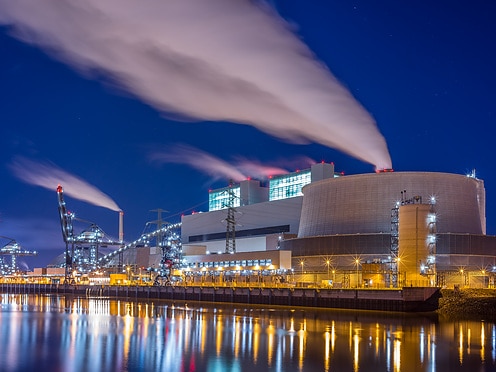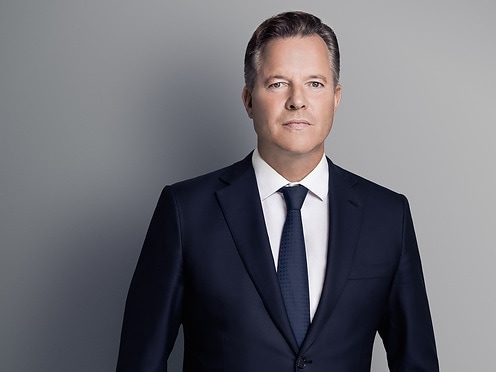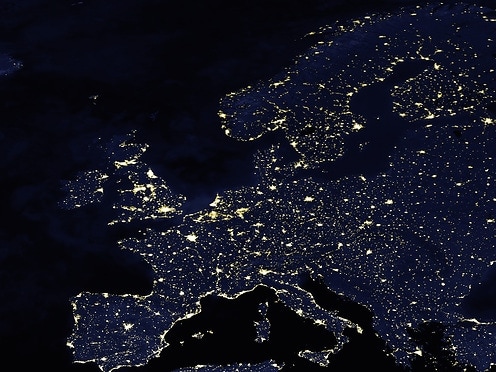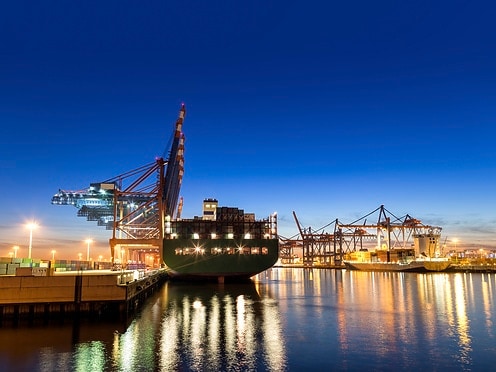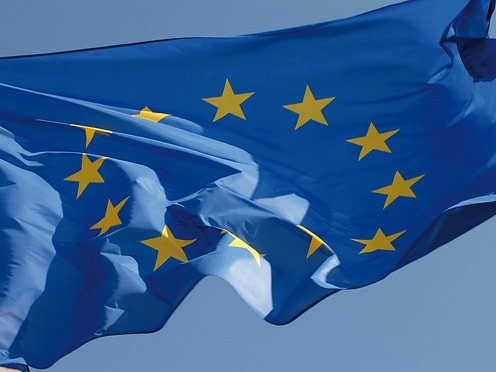The reality behind the New Year’s rhetoric

Employment figures, energy prices and the stock market – an industrial-political assessment.
Oliver Hermes is President & CEO of the Wilo Group, Chairman of the Board of Trustees of the Wilo-Foundation, member of the Board of Trustees of the Family Business Foundation, member of the Board of Trustees of the German Sustainability Award (DNP), member of the Executive Committee of the Near and Middle East Association (NUMOV) and member of the Executive Board of the Africa Association of German Business and the Sub-Saharan Africa Initiative of German Business (SAFRI). He is an essayist with articles published in independent media. The opinions expressed by the author are his own.

At the turn of the year, political decision-makers like to wrap themselves in numbing optimism. They use the contemplative cosiness of the last days and weeks of the year to direct their voters’ attention away from problems and failures and towards (supposed) opportunities. The mantra is: Yesterday is over. Tomorrow can come. Let’s tackle it together.
As far as Germany’s economic and industrial development is concerned, this rhetoric has a distorting effect at the turn of the year 2024/2025. And that is precisely what makes it so dangerous. Accompanied by all kinds of misinterpretations, this creates the impression that Germany’s run-away deindustrialisation is a challenge that can be solved with social cohesion alone.
Quite the opposite, in fact. While the house is already ablaze, the German public is no longer fooled into thinking it is merely table fireworks. When the smoke clears, the charred remains of Germany as a business location come into view, and the facts can no longer be glossed over, too much valuable time will have been lost, putting social peace and cohesion at even greater risk. The causality is therefore reversed!
One thing is clear: We must remain confident. We should not pay heed to alarmism and activism. But we must finally realise the drastic nature of our situation: Germany is facing massive structural problems that are jeopardising our prosperity. We can only take countermeasures if we recognise the facts. That’s why it’s time to clear up the misconceptions that too often cloud our minds.
"Germany is facing massive structural problems that are jeopardising our prosperity."

1. The employment figures
Is the German labour market really booming? The Federal Statistical Office reported in the first few days of the new year that 46.1 million people were employed in Germany in 2024. A record high. But appearances are deceptive, as only the service sector contributed to growth. This includes numerous jobs that are paid for by the public sector. In other words: A side effect of Germany’s overabundance of bureaucracy is that it needs more and more workers to administer itself.
Many of these newly created jobs are part-time. So employees are earning less money, which they could be spending to boost our economy. At the same time, the statistics show that the private sector hardly contributed to the growth in employment at all. Jobs were lost in the business services sector. And even more dramatic: Employment levels also fell in industry, which generally pays well. At the same time, it generates the prosperity of our country, as exporting industrial goods remains the central business model of the Federal Republic of Germany.
The conclusion is sobering. The increase in employment hardly contributes to economic growth and purchasing power. It requires a lower degree of qualification and is less well paid. There is no increase in domestic consumption and therefore no positive impact on other sectors.
The figures are misinterpreted too often. Worse still, employment figures are falsely boasted about in order to suggest economic stability. But in truth, our economy is substantially worse off than ever before. Bankruptcies are on the rise. The unemployment rate has already risen to 6 per cent, but the strong effects of the reduction in employment will not be seen until 2025. We are entering the third year of recession in a row. This has never happened before in the Federal Republic of Germany.

2. Stock market trends
Not only the labour market, but also Deutsche Börse recently made a name for itself with record figures. However, the record highs of the German share index (DAX) also obscure our view of reality. There is much to suggest that we should by no means draw conclusions about Germany’s economic situation or even its prosperity from the DAX successes. After all, there is too little Germany in the German share index. This can be recognised, for example, by the fact that the companies listed there generate a large part of their turnover abroad.
They have also geo-economically and strategically regionalised or localised their supply chains, or are in the process of doing so. This also applies equally to family businesses, which are often not part of the equity markets. Production takes place where the growth markets are abroad and no longer at home, where the framework conditions for economic activity are deteriorating so dramatically.
3. Energy prices
The high energy prices in particular make Germany an unattractive location for industry. The domestic economy has been calling for relief for a long time, but Germany is still one of the five most expensive locations in the world in terms of industrial electricity prices. An unsustainable situation for an industrialised nation. The political response to this: a subsidised reduction in electricity prices. Well then, is everything fine?
Not at all. The redistribution of several billion euros has been lamented for years as the economic policy response to Germany’s biggest structural problem as an industrial nation. However, this can only be a first step. Of course, the money relieves the burden on German industry. But once the smoke has lifted and money is spent, prices will rise again. Politicians have yet to provide German industry with an answer as to how energy prices can be reduced in the long term.

It is clear that an industrialised nation cannot sustain a subsidy-financed price reduction in the long term. But entrepreneurs need planning security for investment decisions. Under what conditions will they obtain energy in Germany in five to ten years’ time? Long-term perspectives are called for. And policy that follows the basic principles of the market economy. Prices are determined by supply and demand. Anyone who considers the market-price mechanisms to be the basis of supply and demand quickly concludes that a shortage of supply leads to higher prices.
Despite the increasing energy shortage, Germany is systematically reducing its energy supply by exiting from nuclear energy and coal-fired power generation. However, the challenge we face is not just compensating for the loss of performance due to the exits and the resulting negative price effects. People tend to forget that energy must not only be affordable, but also secure for business and its supply must be predictable.
The expansion of renewable energies is important. However, industry is dependent on a stable base load. What if – as happened in November/December last year – dark doldrums occur more often because the sun is not shining and the wind is not blowing? Production plans cannot be based on meteorological uncertainties. If Germany wants to become attractive to industry, it must provide safeguards against dark doldrums. If Germany wants to do without conventional energy from hard coal, lignite and nuclear power at the same time, there is no way around an expansion of the distribution and storage infrastructure, which is at best a very ambitious and perhaps even unrealistic plan.
There is also the demand side. One way out of the cost dilemma is to incentivise measures to reduce energy demand more strongly. More energy efficiency measures would significantly reduce costs and substantially increase security of supply. They must also be part of an Energy Transition 2.0 that is geared towards business and industry, which we now urgently need.
Cohesion yes, distorting reality no
In his New Year’s address, Chancellor Olaf Scholz emphasised that Germany is the third largest economy in the world. “Because we work hard and because today's workforce is larger than ever before in our history with more women and men working”, Scholz said. It is questionable how long we will be able to maintain this leading position if we don’t finally change our thinking.
This includes rethinking the energy transition. Without competitive energy prices, we will be an industrialised country without industry. Without industry, we will lose our resilience and will no longer be able to maintain critical infrastructures on our own. We are turning from an exporting nation into a dependent importing country. Prosperity will decline. Germany will get poorer.
This also includes a new way of dealing with reality. Germany’s social cohesion is an important glue and certainly also a motor of our prosperity. But we are jeopardising it, and indeed our democracy as a whole, if we do not begin to confront ourselves with uncomfortable truths.
Sources: Tagesschau; Federal Statistical Office; Federal Employment Agency; Handelsblatt Research Institute; The Pioneer; ZDF heute; Press and Information Office of the Federal Government








